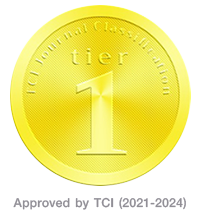Journal Information
Home
Welcome to the official website of the Journal of Arts and Thai Studies (ARTS), Formerly known as the Journal of the Faculty of Arts, Silpakorn University is a peer-reviewed journal (Editorial Board) covering all areas of Humanities, Social Sciences, and Fine Arts launched in 1975. As you explore our website, you will discover valuable research and scholarly articles that have undergone a rigorous peer review. We take pride in ensuring the quality, integrity, and reliability of the research we publish, making ARTS a trusted source of peer-reviewed content in humanities, social sciences, and fine arts. Whether you are a researcher or academic seeking authoritative publications, ARTS provides a platform that showcases cutting-edge research and promotes the advancement of knowledge. Browse our collection of peer-reviewed articles and experience the excellence that ARTS has to offer.
Journal of Arts and Thai Studies (ARTS)
ISSN 2774-1419 (Online)
Start year: 2022
Language: Thai and English
Free access: Immediate
Publication fee: Free of charge
Issues per year (2022): 3 Issues (tri-annually)

Editor-in-Chief
Jutatip Chanlun
Aims and Scope
ARTS is a scholarly journal that follows a rigorous double-blind peer-review process. Published every four months, ARTS is an online open-access journal, overseen by the Faculty of Arts at Silpakorn University. The journal is dedicated to publishing original and high-quality research articles, review articles, and book reviews in the fields of humanities, social sciences, fine arts, and any topics pertaining to Thai studies.
ARTS welcomes manuscripts covering a wide range of topics including:
- Humanities: Language, Literature, Linguistics, Philosophy, Ethics, and Religion.
- Social Sciences: History, Sociology, Anthropology, Economics, Geography, Library and Information Science, Law, Political Science, Communication, and Cultural Studies.
- Fine Arts: Painting, Sculpture, Printmaking, Visual Arts, Performing Arts, Music, and Art History.
Furthermore, ARTS welcomes articles that explore the study of Thailand across various disciplines: language, culture, traditions, arts, politics, administration, and other relevant fields. The journal aims to provide a platform for comprehensive research and scholarly discourse in these areas.
ARTS continues to welcome Thai articles, primarily driven by its aspiration to maintain uniqueness in the realm of research, concentrating on the humanities, social sciences, and fine arts. This includes Thai studies that delve into the perspectives of Thai people, society, and Thailand as they relate to the contemporary global context. Nevertheless, the journal also extends its embrace to articles composed in English, provided they fall within the predefined aims and scope of the journal.
Articles submitted to ARTS will undergo a rigorous peer-review process, ensuring high quality and scholarly integrity. Expert reviewers, who possess expertise closely aligned with the content of the articles, will assess them for quality. Additionally, the journal employs an instant quality assessment mechanism to expedite the evaluation process. Reviewers are drawn from a diverse range of institutions to ensure a comprehensive and unbiased evaluation.
ARTS offers unrestricted access to its published articles, catering specifically to scholars, researchers, and individuals with academic interests. This open-access policy facilitates extensive utilization of the journal's content, enabling easy accessibility for academic study and research purposes.
Publication Malpractice Statement: Journal of Arts and Thai Studies (ARTS) has a zero-tolerance policy towards publication malpractice. We uphold the highest ethical standards and take misconduct allegations seriously. Our publication malpractice statement includes the following principles:
1. Plagiarism: ARTS considers proper acknowledgment and permission when using others' work a fundamental aspect of research integrity. Any failure to comply with these principles will not be tolerated. If such misconduct is detected, the manuscript will be immediately rejected, and appropriate actions will be taken.
2. Fabrication and Falsification: ARTS strictly prohibits the fabrication or falsification of data or results. Authors are expected to present accurate and reliable data, and any manipulation or misrepresentation of research findings is considered a severe breach of ethical conduct.
3. Multiple Submissions: Manuscripts submitted to ARTS must not be simultaneously under consideration by any other journal or conference proceedings. Simultaneous submission of the same work to multiple publications is unethical and will result in immediate rejection.
4. Authorship Disputes: Authorship disputes should be handled appropriately to ensure that authorship accurately reflects the contributions of individuals involved in the research. Any disagreements or misrepresentation of authorship must be resolved before submitting the manuscript. ARTS holds authors responsible for providing accurate and complete information regarding authorship.
5. Peer Review Integrity: ARTS maintains the integrity of the peer review process and strictly prohibits any attempts to manipulate it. Coercing reviewers or providing false recommendations is considered unethical and will not be tolerated.
6. Retraction and Corrections: In cases where significant errors or misconduct are identified in a published article, ARTS will take appropriate action, including issuing retractions or publishing corrections to rectify the situation. Corrections will be made promptly, transparently, and in accordance with established guidelines.
7. Reporting Misconduct: ARTS encourages authors, reviewers, and readers to report any suspected misconduct, ethical violations, or concerns regarding published articles. Reports of this nature will be thoroughly investigated, and necessary actions will be taken based on the findings.
ARTS is dedicated to ensuring the integrity of the scholarly publishing process and upholding the trust placed in us by authors, reviewers, and readers. We are committed to promptly addressing any instances of publication malpractice and maintaining the highest standards of ethical conduct throughout the publication journey.



